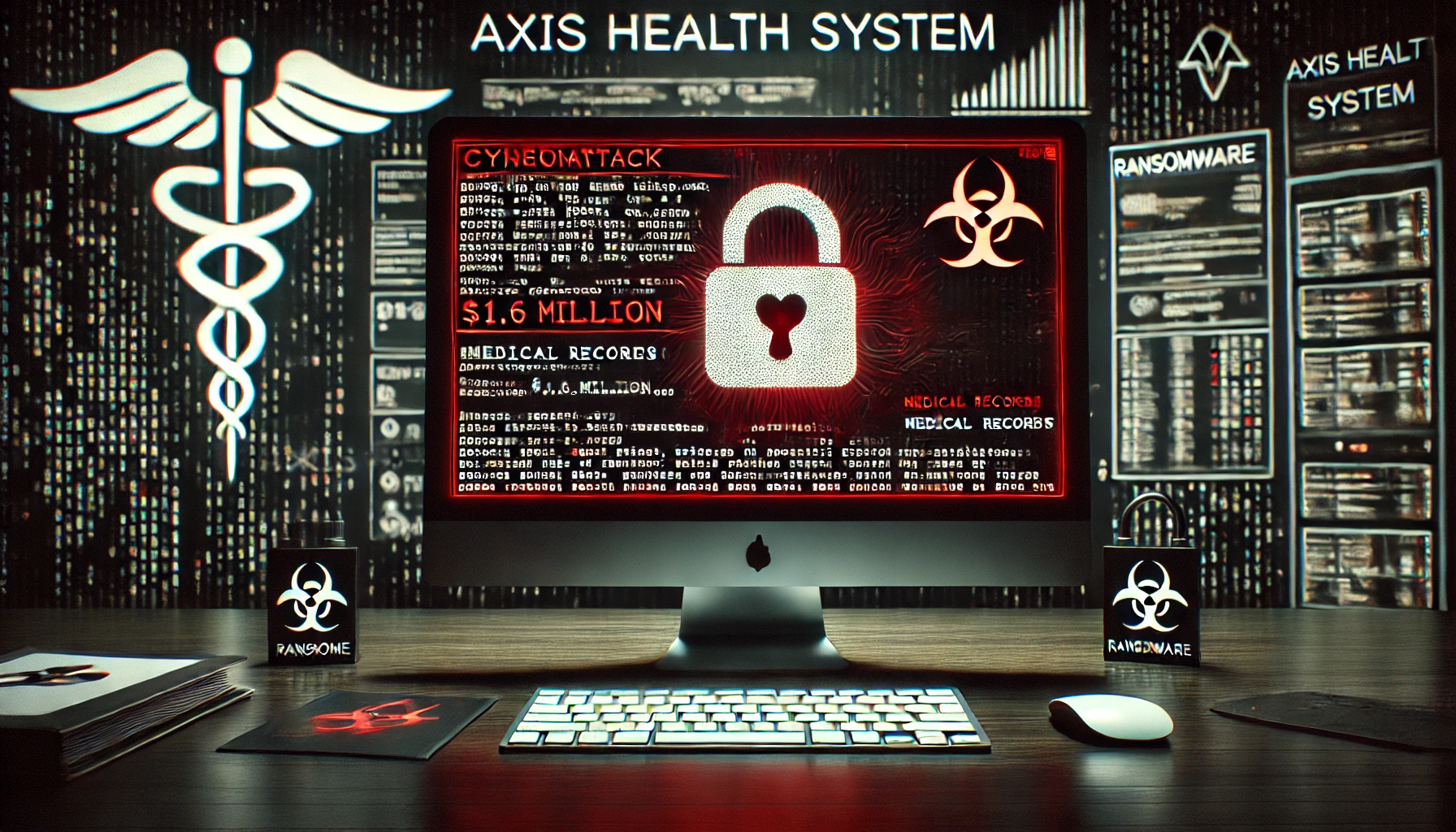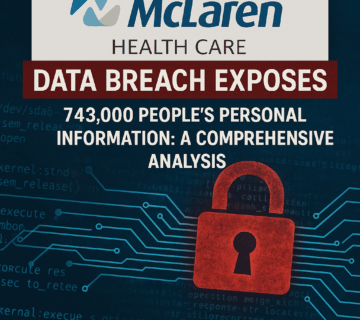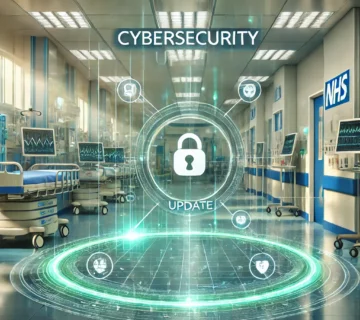Ransomware Group Demands $1.6 Million from Axis Health System Target of Cyberattack

Cyberattacks on healthcare systems have become an increasingly alarming issue, affecting both patient care and data privacy. One of the latest victims is Axis Health System, a nonprofit organization that provides mental health and substance abuse treatment services across Southwest Colorado. The organization has been hit by a cyberattack, with a ransomware group demanding $1.6 million in exchange for the release of its encrypted data.
In this detailed article, we will explore the specifics of the cyberattack on Axis Health System, the implications of such incidents on healthcare organizations, and how Technijian—a leading cybersecurity and IT service provider—can assist healthcare organizations in safeguarding their systems against future attacks.
Table of Contents
- Overview of the Cyberattack on Axis Health System
- How Ransomware Attacks Affect Healthcare Organizations
- Steps Taken by Axis Health System
- Who Is Rhysida Ransomware Group?
- Investigations into the Cyberattack
- The Role of Private Investigators and the FBI
- Status of Patient Data: What We Know
- What Is Ransomware? Understanding the Threat
- Why Healthcare Organizations Are Prime Targets
- How Cybersecurity Firms Can Help in Ransomware Cases
- What Should Healthcare Organizations Do After a Cyberattack?
- The Growing Trend of Cyberattacks on Nonprofits
- How Technijian Can Help Protect Healthcare Systems
- Best Practices for Healthcare Organizations to Prevent Cyberattacks
- FAQs
1. Overview of the Cyberattack on Axis Health System
On October 15, 2024, Axis Health System, which operates several mental health and substance use treatment facilities in Southwest Colorado, announced that it had been the victim of a cyberattack. The cyberattack involved a ransomware group, known as Rhysida, which demanded a ransom of 25 bitcoin (equivalent to $1.6 million) to release Axis’ encrypted data.
Axis Health System has not revealed when exactly the attack was discovered, but it is clear that the organization acted swiftly, notifying the FBI and hiring a private contractor to investigate the breach. However, the details surrounding the attack, including the extent of the potential data breach, remain undisclosed at this time.
Axis has followed standard incident response protocols, which included halting the unauthorized activity and beginning an investigation into the nature and scope of the breach.
2. How Ransomware Attacks Affect Healthcare Organizations
Ransomware attacks on healthcare systems can have devastating consequences, both in terms of patient care and financial stability. For organizations like Axis Health System, which serves vulnerable populations, an attack can disrupt services, delay treatments, and create a significant loss of trust among patients. Cyberattacks can lead to:
- Interruption of critical healthcare services, delaying patient care.
- Compromised patient data, leading to potential breaches of sensitive personal information.
- Financial losses due to ransom payments, fines, and remediation costs.
- Reputational damage, impacting the trust of patients and stakeholders.
In this case, it remains unclear whether any patient data was compromised, but if it were, Axis would face an uphill battle to regain the trust of those it serves.
3. Steps Taken by Axis Health System
According to Axis Health System’s spokeswoman, Haley Leonard-Saunders, the organization promptly followed its incident response protocol upon discovering the attack. This included:
- Stopping the unauthorized access to their systems.
- Launching an internal investigation.
- Notifying the FBI and collaborating with a private investigator.
As of now, Axis’ patient portal remains nonoperational for unrelated reasons, and by Tuesday, all impacted systems had been restored.
The organization has yet to provide a concrete timeline for when the investigation will be completed, and it has not disclosed whether the ransom will be paid. If any patient data is found to have been compromised, affected individuals will be notified directly by mail.
4. Who Is Rhysida Ransomware Group?
Rhysida is a relatively new player in the world of ransomware, first making headlines in 2023. Like other ransomware groups, Rhysida infiltrates organizations’ networks, encrypts sensitive data, and demands payment for its release. They typically target high-value sectors like healthcare, government, and education, where the need to regain access to data is critical.
In this case, Rhysida has claimed responsibility for the attack on Axis Health System through a post on X (formerly Twitter), demanding 25 bitcoin ($1.6 million) in exchange for the data they have encrypted. The exact nature of the data they possess remains unclear.
5. Investigations into the Cyberattack
The Axis Health System cyberattack is currently under investigation by both the FBI and a private cybersecurity contractor hired by Axis. This dual investigation is standard in ransomware cases and aims to:
- Identify the attackers and their methods.
- Assess the scope of the breach.
- Determine whether sensitive data was accessed or stolen.
Private investigators often work alongside federal agencies to ensure the organization recovers from the attack while also trying to prevent future incidents.
6. The Role of Private Investigators and the FBI
In cyberattacks like the one on Axis Health System, private investigators play a crucial role. These professionals are typically hired by the affected organization to conduct a thorough analysis of the breach. Their tasks include:
- Forensic analysis of compromised systems.
- Identifying vulnerabilities exploited by the attackers.
- Assisting in system restoration and strengthening security post-breach.
The FBI’s involvement is essential for both legal and investigative reasons. They help coordinate the national effort to track down and prosecute cybercriminals, especially in cases where ransomware groups operate across borders.
7. Status of Patient Data: What We Know
As of now, the status of Axis Health System’s patient data remains unclear. While the investigation continues, no public confirmation has been made regarding whether any personal health information (PHI) or other sensitive data was accessed or stolen during the attack.
The potential exposure of patient data is a significant concern. Protected Health Information (PHI) is a valuable asset for cybercriminals, as it can be used for identity theft or sold on the dark web. Healthcare providers are required by law to notify affected patients if their data has been compromised, which Axis has pledged to do if necessary.
8. What Is Ransomware? Understanding the Threat
Ransomware is a type of malware that locks or encrypts data on a victim’s computer or network, rendering it unusable. The attacker then demands payment, usually in cryptocurrency, for the decryption key needed to regain access to the data.
Ransomware attacks are particularly harmful in industries like healthcare, where access to data is critical for patient care. The downtime caused by an attack can be costly, both in terms of lost revenue and compromised patient safety.
9. Why Healthcare Organizations Are Prime Targets
Healthcare organizations like Axis Health System are attractive targets for ransomware groups for several reasons:
High-stakes environment: Disruptions to healthcare services can put lives at risk, making organizations more likely to pay ransoms to resume operations quickly.
Valuable data: Healthcare providers store vast amounts of sensitive data, including personal, financial, and medical information, which can be sold or exploited.
Outdated security infrastructure: Many healthcare organizations still use legacy systems with outdated security protocols, making them more vulnerable to attacks.
10. How Cybersecurity Firms Can Help in Ransomware Cases
In the event of a ransomware attack, cybersecurity firms can offer immediate and long-term support. They can:
Negotiate with attackers (if necessary) and attempt to reduce the ransom amount.
Assist in data recovery and system restoration.
Identify vulnerabilities that led to the attack and help to secure the network against future threats.
Cybersecurity firms play an essential role in minimizing the damage caused by ransomware attacks and ensuring that the affected organization can recover and rebuild.
11. What Should Healthcare Organizations Do After a Cyberattack?
After a cyberattack, healthcare organizations must take immediate action to mitigate the damage and prevent further incidents. Key steps include:
Isolate infected systems to stop the spread of malware.
Notify law enforcement and regulatory bodies, such as the FBI and Department of Health and Human Services (HHS).
Hire cybersecurity experts to assess the breach and guide recovery efforts.
Communicate with stakeholders, including patients, staff, and partners.
Evaluate long-term security measures and implement new protections, such as stronger encryption and multi-factor authentication.
12. The Growing Trend of Cyberattacks on Nonprofits
Nonprofit organizations, including healthcare providers like Axis Health System, are increasingly becoming targets of cybercriminals. Nonprofits often lack the robust security infrastructure that larger, for-profit corporations have, making them more vulnerable to attacks. Furthermore, these organizations frequently manage sensitive data, making them appealing targets for ransomware groups.
13. How Technijian Can Help Protect Healthcare Systems
Technijian, a leading cybersecurity and managed IT service provider, specializes in safeguarding healthcare organizations from cyberattacks. With years of experience working with sensitive data, Technijian offers tailored solutions that ensure healthcare systems remain secure and compliant with federal regulations, such as HIPAA.
Here’s how Technijian can help:
Comprehensive security audits: Identifying vulnerabilities before cybercriminals can exploit them.
24/7 monitoring: Constant surveillance of systems to detect and prevent attacks.
Incident response: Rapid deployment of resources to stop ongoing cyberattacks and mitigate damage.
Data recovery: In case of a breach, Technijian helps recover lost or encrypted data without paying ransoms.
Employee training: Ensuring staff members are aware of phishing scams and other tactics used by cybercriminals.
By partnering with Technijian, healthcare organizations can reduce their risk of falling victim to cyberattacks and ensure they have a robust plan in place to respond swiftly in case of an incident.
14. Best Practices for Healthcare Organizations to Prevent Cyberattacks
Preventing cyberattacks requires proactive measures. Here are some best practices healthcare organizations should adopt:
Regular software updates and patch management to close security gaps.
Use of encryption for all sensitive data.
Multi-factor authentication (MFA) to prevent unauthorized access.
Employee education and phishing awareness training to reduce human error.
Regular security audits to identify and fix vulnerabilities.
Backups: Maintain regular, secure backups of all critical data.
Zero Trust policies to ensure that access to sensitive systems is restricted.
FAQs
Q1: What is ransomware, and how does it work?
A1: Ransomware is a type of malware that encrypts data and demands payment for its release. Attackers typically demand payment in cryptocurrency, such as Bitcoin, in exchange for the decryption key.
Q2: Was patient data affected in the Axis Health System cyberattack?
A2: It is unclear whether patient data was compromised. Axis Health System has stated that affected individuals will be notified if any sensitive information was accessed.
Q3: How can healthcare organizations protect themselves from ransomware?
A3: Healthcare organizations can protect themselves by implementing strong security measures, including encryption, multi-factor authentication, regular backups, and employee training.
Q4: Should Axis Health System pay the ransom?
A4: Paying a ransom is discouraged by law enforcement agencies, as it does not guarantee the safe return of data and encourages further attacks.
Q5: What should I do if I think my healthcare data has been compromised?
A5: If you believe your healthcare data has been compromised, monitor your accounts closely, report any suspicious activity, and consider placing a fraud alert on your credit report.
Q6: How does Technijian help healthcare providers prevent cyberattacks?
A6: Technijian helps healthcare providers by offering 24/7 monitoring, incident response, data recovery, and security audits to identify and fix vulnerabilities before they are exploited.
About Technijian
Technijian is a premier provider of managed IT services in Orange County, delivering top-tier IT solutions designed to empower businesses to thrive in today’s fast-paced digital landscape. With a focus on reliability, security, and efficiency, we specialize in offering IT services that are tailored to meet the unique needs of businesses across Irvine, Anaheim, Riverside, San Bernardino, and Orange County.
Located in the heart of Irvine, Technijian has earned a reputation as a trusted managed service provider in Irvine for businesses seeking robust IT support. Our dedicated team of IT experts ensures that your technology infrastructure is always optimized, secure, and aligned with your business goals. Whether you require IT support in Irvine, IT support in Orange County, managed IT services in Irvine, or IT services in Orange County, we’ve got you covered. Our expertise also extends to providing managed IT services in Anaheim, IT support in Riverside, and IT consultant services in San Diego.
As a leader in IT support in Orange County, we understand the challenges businesses face when maintaining and advancing their IT environments. That’s why our comprehensive suite of services includes IT infrastructure management, IT support in Anaheim, IT help desk, and IT outsourcing services. With proactive monitoring, disaster recovery, and strategic consulting, our goal is to minimize downtime, enhance productivity, and provide IT security services that give you peace of mind.
At Technijian, we take pride in offering customized managed IT solutions that exceed client expectations. From small businesses to large enterprises, our IT services in Irvine are designed to scale with your needs and support your growth. We specialize in cloud services, IT systems management, business IT support, technology support services, IT network management, and enterprise IT support. Whether you’re looking for IT support in Riverside, IT solutions in San Diego, or managed services in Orange County, Technijian has the expertise to meet your requirements.
Our managed service providers in Orange County offer comprehensive solutions for every business need. Whether you need help with IT performance optimization, IT service management, or IT security solutions, we provide services that enable businesses to remain agile in today’s competitive market. Our IT support services in Orange County and managed IT services in Irvine ensure your operations remain secure, productive, and future-ready.
We also offer managed service provider services and IT support in Irvine, CA, focusing on delivering efficient and scalable IT services across Southern California. Technijian is committed to providing IT managed services in Irvine, IT support in Anaheim, and IT services in Orange County, CA that adapt to the ever-changing demands of business technology.
Experience the difference with Technijian—your trusted partner for IT consulting services, managed IT services, and IT support in Orange County. Let us guide you through the complexities of modern IT infrastructure and help you achieve your business objectives with confidence.


